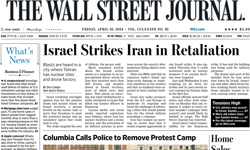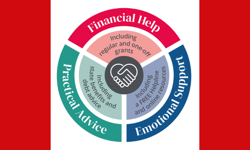Imagine for a moment you were right up against a very tight deadline on a long-planned book on newspaper ethics. The only way to get it done was to go to a friend’s cottage on a remote island with no BlackBerry reception for the months of July and August and turn off all news sources.
All done and dusted by the August Bank Holiday complete with a chapter on the News of the World hacking scandal - a judicious treatment of Royal communications director Paddy Harverson’s realisation that a modest story about Prince William’s minor knee injury could only have been obtained one way. It obviously included the jailing of NotW Royal reporter Clive Goodman and his private eye accomplice Glenn Mulcaire. It was legitimate to raise the widespread suspicions that the single “rogue” reporter narrative seemed hugely implausible.
But there are notoriously tough libel laws in England and former NotW editor Andy Coulson and Rebekah Brooks, the chief executive of News International both denied fervently all knowledge or wrong-doing. The NI chief executive at the time, the well-respected Les Hinton scarcely came into the frame and anyway was thousands of miles away as publisher of the Wall Street Journal. As for James Murdoch, he had been running BSkyB, the satellite broadcaster, in recent years before taking over Hinton’s NI role.
Impractical surely to think that Rupert Murdoch as he approached his 80th year and still running his world-wide empire would have known anything about a seedy private eye and a Royal reporter with a faulty moral compass.
The Guardian had continued to nibble away at the story year after year. But they would, wouldn’t they? And Baroness Buscombe, the barrister who chairs the Press Complaints Commission warned the paper about the dangers of exaggeration in its obsessive coverage and virtually accused the lawyer Mark Lewis of lying when he claimed that the phones of thousands had been targeted.
Damn. After two months of revelations that have shaken the newspaper industry to the core, the entire book needs rewriting.
Who could have possibly have imagined that:
* the hacks would have hacked the phone of missing schoolgirl Milly Dowler
* a Twitter/Facebook call for an advertiser boycott would lead to the closure of the News of the World after 168 years
* the PCC would be denounced by Prime Minister David Cameron as a “failed” organisation
* a judicial inquiry would be looking at the ethics and standards of the media as a whole before getting its teeth into hacking
* Rupert Murdoch would be hauled in front of a Commons Select committee in chains – well almost - for the most “humbling” day of his life
* and members of the hierarchy of NotW at the time would have their collars felt by the police and the names just keep tumbling out
* The scandal would scupper Murdoch’s multi-billion deal to own all of BSkyB, probably for ever
As summer ends, where have we reached in this extraordinary tale? What will the impact on newspapers and journalism be and what happens next?
News of the World closure
First, was it really necessary to close the News of the World, a newspaper hated by some but regarded by others as a British institution, including many of its millions of readers?
Murdoch “voluntarily” saying goodbye to 2.6 million sales a week; you must be joking?
Of course things looked very bleak for the paper. Advertisers were bailing out and there might have been a readers’ boycott on the back of public disgust over the Milly Dowler revelations. But while Twitter and Facebook can conjure up instant pandemonium, a younger Rupert Murdoch would almost certainly have taken a longer view and faced down his critics while making certain there was no-one working at the paper who was involved with, or had knowledge of, the hacking. An Ombudsman would be appointed - whatever it took to restore public confidence.
If the aim was to protect Rebekah Brooks and keep the BSkyB deal alive, the decisive strategy failed miserably.
The result is more than 600,000 sales a week lost forever to the newspaper industry. The fact that the rivals have managed to pick up around 2 million of extra sales, with the Sunday Mirror the main beneficiary, is a great achievement by historic standards, but some of those sales could go soggy once the special offers are withdrawn.
If a younger Murdoch had decided to close the NotW, there would have been an instant Plan B already in place to launch The Sun on Sunday.
Now the only hope for the News of the World is if a former editor of the paper, David Montgomery, goes for a re-launch – the newspaper equivalent of AFC Wimbledon.
Naming names
Is there now a smoking gun? Most definitely. Clive Goodman’s letter appealing against his dismissal in which he claims he was promised a job after serving his sentence is very damaging.
The allegations that named individuals openly discussed the practice at news conferences until warned to avoid specific mentions in future are even worse.
If that wasn’t bad enough, four former NI executives have been called to give evidence to the Select committee – Tom Crone, the former legal manager, Colin Myler, the former NotW editor, Daniel Cloke, the former NI human resources director and Jon Chapman, the former NI legal affairs director.
All of them, who in different ways will regard themselves as being treated as scapegoats, will have things to say and names to name.
There might also be a veritable arsenal of smoking guns in the more than 8,000 pages of emails now being trawled through by police.
How serious is Lord Justice Leveson’s inquiry into the phone hacking scandal for the press and media in general?
Potentially very serious.
Some sort of inquiry was probably inevitable. When in doubt, politicians always reach for an inquiry even though most of the behaviour complained of was counter to the criminal law and could have been dealt with by the judicial system - once exposure by the media, mainly the Guardian, had demonstrated the seriousness of the problem.
Two worries. The inquiry has been broadened out far beyond phone-hacking and will launch with a general examination of press ethics and practices and can look at all of the media, including social networks.
“At some stage, there needs to be a discussion of what amounts to the public good, to what extent the public interest should be taken into account and by whom,” the former criminal lawyer explains.
Fine but who knows where such an inquiry will end - probably a long way from illegal phone-hacking.
The second worry is that there is no-one on the Leveson inquiry with any knowledge or experience of tabloid journalism, its mores and pressures. The three distinguished journalist members - Sir David Bell, former chairman of the Financial Times, Eleanor Goodman former political editor of Channel 4 News and George Jones, former political editor of the Daily Telegraph have all spent their working lives in “broadsheet” journalism.
PCC: RIP?
Is the PPC doomed as David Cameron seemed to imply during the summer?
Probably in its current form and the name will have to change again but you will still need a body to carry out the work currently done by the Commission.
Despite doing a reasonable job on most fronts, the decision by Baroness Buscombe not to seek a further term was probably inevitable following the payment of libel damages to Mark Lewis. A mauling live on air by Andrew Neil in The Daily Politics was probably the last straw.
A change at the top does provide the opportunity for reform and there will be no shortage of top-level candidates to replace the Baroness. Former senior Cabinet ministers are almost queuing up for the £170,000-a-year post.
The big outstanding question is whether self-regulation of the press, which began in 1953 with the creation of the Press Council in response to threats of statutory control, will now come to an end.
The likeliest outcome? A half way house - a Press Standards Authority rather like the Advertising Standards Authority which is largely autonomous but operates under the aegis of Ofcom, the media regulatory body.
The main obstacle to such a solution is the opposition of Ofcom. Chief executive Ed Richards shows no signs of wanting to get involved in the potentially poisonous business of press regulation.
Does this mean that the hacking scandal is done and dusted now that other, even more dramatic stories such as urban riots and the fall of Gaddafi, have crowded it out of the headlines.
Not likely. It will continue to unfold like a Greek tragedy engulfing more and more reputations and adding further culprits to the UK’s already overcrowded jails.
The mechanics are clear. News International has stopped meeting the legal payments of the likes of Mulcaire and apparently reneged on a deal entered into with Clive Goodman.
They are likely to start talking.
Anyway, apart from his presumably fractured relationship with NI, Mulcaire is being forced by a civil action to submit the names of those who hired him to hack the phones of celebrities.
Whatever the mechanism, you can be sure that all the names of those involved will eventually come out. It could be in evidence to the Select Committee which will almost certainly go for a recall of James Murdoch, if not also his father.
The police, now taking the matter extremely seriously at last, could find more damning evidence in the vast pile of electronic traffic.
The most likely thing is that when charges come to be laid and the threat of prison looms closer, the sound of those trying to save their skins will be like a dawn chorus.
It that was not enough, the scandal could take on a new even more dangerous dimension for News Corporation if it were ever found that Murdoch journalists were responsible for trying to hack the phones of 9/11 victims or their families.
It is also far from clear that the News of the World was a lone rogue newspaper. What if other publishers were involved too?
The only certainty is that even after two months of mayhem this summer, any book on media ethics will need at least another new chapter by the Spring.










